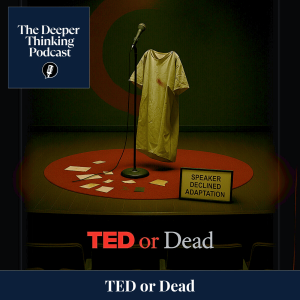
5 days ago
TED or Dead - The Deeper Thinking Podcast
TED or Dead
For those who refuse to arc. For those who resist formatting. For those who remain honest in the face of narrative coercion.
When survival becomes a story requirement, and healing must perform to be believed, what happens to those who can’t—or won’t—comply? In this episode, we examine how emotional life has been captured by performance culture. We explore the affective coercion embedded in storytelling frameworks like TED Talks, where trauma must arc, insight must inspire, and recovery must be visible to be valid. What if refusal isn’t dysfunction, but fidelity?
Drawing from Lauren Berlant’s notion of cruel optimism, Sara Ahmed’s work on affective economies, and Judith Butler’s ethics of intelligibility, we reconsider what it means to live truthfully when formatting becomes mandatory. Refusing to arc becomes an act of epistemic resistance.
This is not a celebration of dysfunction, but a meditation on the hidden violence of legibility. The essay makes space for silence, for narrative disobedience, for truths that cannot be shaped into slides. It’s not TED. It’s not Dead. It’s the grey zone in between—the unstageable, unperformable self that still demands to be known.
Reflections
- Some truths lose their integrity the moment they arc.
- Refusal is not failure. It’s fidelity to something deeper than narrative.
- Survival doesn’t always look like resolution. Sometimes it looks like staying silent.
- Adaptation is not always healing. It is sometimes erasure.
- There is nothing wrong with not being TED-ready.
Why Listen?
- Interrogate the emotional politics of public storytelling
- Explore what cruel optimism looks like in trauma narratives
- Learn how narrative structures can suppress complex or ongoing harm
- Engage with Butler, Ahmed, and Berlant on affect, legibility, and resistance
Listen On:
Support This Work
If this episode resonated and you’d like to support more slow, careful work like this, you can do so here: Buy Me a Coffee.
Bibliography
- Berlant, Lauren. Cruel Optimism. Duke University Press, 2011.
- Ahmed, Sara. The Cultural Politics of Emotion. Edinburgh University Press, 2004.
- Butler, Judith. Giving an Account of Oneself. Fordham University Press, 2005.
Bibliography Relevance
- Lauren Berlant: Illuminates how hope becomes coercion when survival is aestheticized.
- Sara Ahmed: Maps how emotion circulates socially, privileging visibility over integrity.
- Judith Butler: Challenges how the demand for narrative legibility often erases complex truths.
In a world that wants your arc, sometimes the most radical thing you can do is stay jagged.
#TraumaNarrative #LaurenBerlant #SaraAhmed #JudithButler #TEDTalks #NarrativeEthics #Adaptation #EmotionalLegibility #TheDeeperThinkingPodcast
Comments (0)
To leave or reply to comments, please download free Podbean or
No Comments
To leave or reply to comments,
please download free Podbean App.